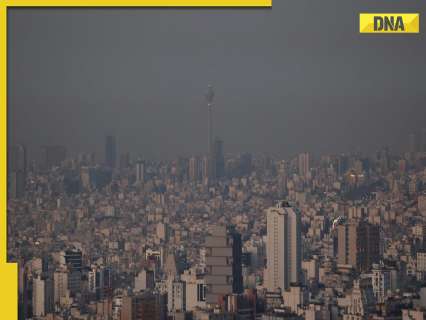
The Israeli military didn’t say much about the attacks, which were in response to an Iranian rocket attack on Israel earlier this month. They only said they were “precise” and meant to hit “military targets in Iran.”
Israeli attacks on Iran early Saturday morning hit targets in Tehran. This was the latest in a series of rising tensions between the two regional enemies that have made people fear a full-scale war in the Middle East.
The Israeli military didn’t say much about the attacks, which were in response to an Iranian rocket attack on Israel earlier this month. They only said they were “precise” and meant to hit “military targets in Iran.”
“Both our offensive and defensive capabilities are fully operational,” Daniel Hagari, spokesman for the Israel Defence Forces, said. “We will do anything to protect the people of Israel and the State of Israel.”
The main targets of the Israeli attack are “military targets” where Iran makes or fires missiles at Israel, as well as Iranian air defence equipment.
One person who knows about the attack said, “It’s going to be big; there are going to be a couple more waves.”
People are not going after nuclear sites or energy systems, the person said. Israeli Prime Minister Benjamin Netanyahu is meeting with his top security officials at the Israeli military headquarters in Tel Aviv right now, according to a narrative from his office in the Financial Times.
Fars News Agency, which is close to Iran’s special Revolutionary Guards, said that “Israel attacked several military sites in western and southwestern Tehran.”
People in Tehran and the western city of Karaj (35 Kms west of Tehran) could hear explosions, and Iranians on social media wrote about several blasts that shook the capital.
As Netanyahu’s government prepared its response to an Iranian ballistic missile attack on the Jewish state three weeks ago, the United States had advised Israel to refrain from striking Iran’s nuclear sites or Oil facilities.
Sean Savett, spokesperson for the US National Security Council, stated, “We understand that Israel is conducting targeted strikes against military targets in Iran as a form of self-defence and in response to Iran’s ballistic missile attack against Israel on October 1.”
On October 1, Iran launched over 180 ballistic missiles at Israel in response to the Israeli assassination of Hassan Nasrallah, the leader of the Lebanese militant group Hizbollah, during an air strike on Beirut.
The attack was anticipated, but it was far more intense than an earlier Iranian strike on Israel in April. That previous assault involved hundreds of missiles and drones. While it marked Iran’s first direct attack on Israel, it caused little damage, as most of the missiles were intercepted.
Israeli missiles hit a military base near the Iranian city of Isfahan in response, and that tit-for-tat exchange ended quickly.
An intelligence base just north of Tel Aviv, Israel’s commercial hub, was one of the many targets of this month’s Iranian attack, which came with little warning. Israel was planning a stronger reaction than it did in April.
Iran has said it doesn’t want a full-scale war, but it has also promised to fight back if it is attacked. How it responds will depend on how big and what kind of attacks Israel makes.
Iran’s foreign minister warned this week that the Islamic government would respond with equal force to any attack.
Initially, Iranian state-run media tried to downplay the impact of the Israeli strikes.
Official Revolutionary Guards news agency Tasnim said that “no damage occurred at military sites” and that the explosions were “caused by the army’s air defence systems.” Iran has stopped all planes until further notice.
The US sent the Terminal High Altitude Area Defence (Thaad) battery earlier this month to strengthen Israel’s air defences before it makes its planned reaction.
Thursday (24th October ), the US Central Command said that several F-16 fighter planes had arrived in the area to help Israel in case Iran decides to react.
What Iran does next will be interesting to see.
Israel is claiming rights to react and is trying to discourage Iran. Though Iran’s response will be crucial to observe, this is quite important.
Along with the Russian leader and officials and representatives from around two dozen nations, Iran’s president recently attended the BRICS conference in Russia.
Iran was manipulating the room to inspire anti-Israel feeling among the non-western visitors.
According to Israel, the State of Israel has the right and the need to react, same as every other legitimately nation in the world.
Israel is now under mobilisation to carry out these strikes and guard the nation against possible reactions by Iran.
Over the past few weeks, this counterattack was meticulously planned, coordinated, and telegraphed.Much negotiation went into determining which kind of reaction might not start a more general war.
Antony Blinken, the US Secretary of State, is in the area this week; it is undoubtedly on his mind.
Still, nations in the Middle East, including Egypt, paid close attention to the BRICS summits in Russia.
Most of the region’s nations seem to be accepting the Israeli strikes as inevitable.
The situation is now in Iran’s hands. If Iran refuses to change its stance or stop its actions, the conflict could escalate further. In simple terms, this means that if Iran continues with its current approach or responds aggressively, tensions are likely to increase, leading to more serious conflict.
(The author of this article is a Defence, Aerospace & Political Analyst based in Bengaluru. He is also Director of ADD Engineering Components, India, Pvt. Ltd, a subsidiary of ADD Engineering GmbH, Germany. You can reach him at: girishlinganna@gmail.com)
(Disclaimer: The views expressed above are the author’s own and do not reflect those of DNA)
